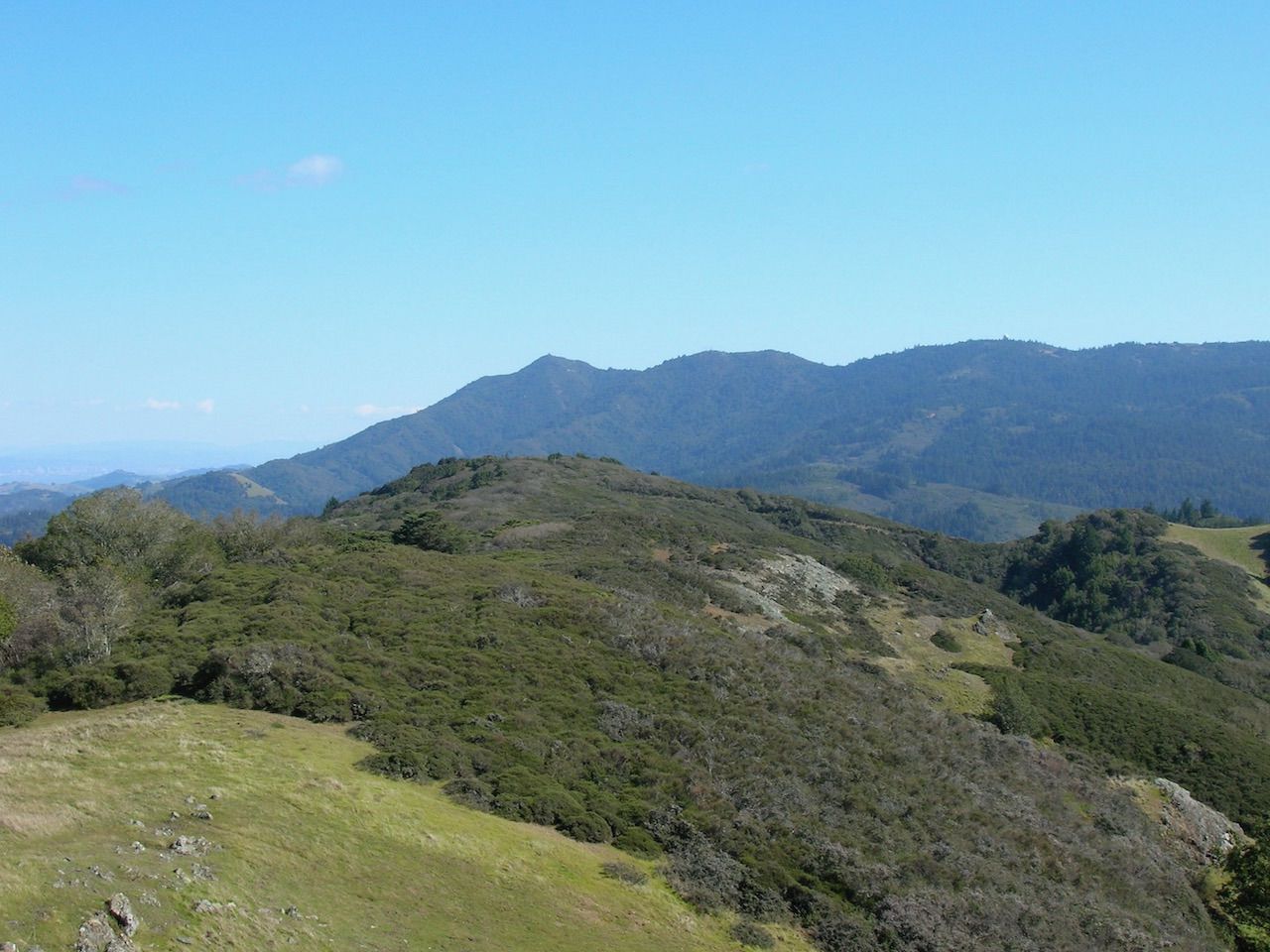Plex: 5 July 2023
5-Minute University; endless breakout summer: cicolab redux two years on; Inevitable Complexity: Civilization's Life Cycle and the Challenge of Degrowth; Green and Blue; Get The F**k Out – Update

The Biweekly Plex Dispatch is an inter-community newspaper published by Collective Sense Commons on first and third Wednesdays of each month. Price per issue: 1 USD, or your choice of amount (even zero).
In This Issue
- 5-Minute University
- endless breakout summer: cicolab redux two years on
- Inevitable Complexity: Civilization's Life Cycle and the Challenge of Degrowth
- Green and Blue
- Get The F**k Out – Update
5-Minute University
by Jerry Michalski
In this week's OGM Thursday call, we're going to test the 5-Minute University format. You'll find details on how, here (written for recording and posting 5minUs; adapt for live). Please consider sharing something you care about, and email Jerry to get on the list to present.
Because the format is 5 minutes presenting, followed by 5 minutes of Q&A, we have max room for 9 presenters in one OGM call. If this works well, we'll add it to our formats and do it again.
Please rehearse your presentation and trim it back to 5 minutes. You won't have time to tell us everything you know about the topic, so distill it until the most important things remain.
Separately, summer travel plans are shifting the NeoBook project to asynchronous mode, which means we won't hold the Monday calls (usually at 10:30am Pacific) until August 6.
endless breakout summer: cicolab redux two years on
(aka curse of the collective intelligence virus)
by charles blass
some reminiscent images and links from charles, on the occasion of the 2nd anniversary of sending out what ended up being his last post to the cicolab newsletter. CICOLAB, we hardly knew ye... – Pete



semi random sprouts from the cicompost:
“gone fishin’ | breakout summer” (CICOLAB newsletter) (July 5, 2021)
we’re developing and harnessing a collective intelligence workflow to build a dynamic knowledge repository in service of growing and harvesting collective wisdom while building a rapid learning network within the wisdom stack framework
(cb cicolab summary march 2020)
The Wisdom Stack: Essential Elements of a Rapid Learning Network (Google Docs)
newsletter archives (CICOLAB newsleter)
FlowShow Remix Playlist - CICOLAB Remixes (YouTube)

Educational Summit (YouTube)
the LearninGarden (YouTube)
PEERAGOGY PODCAST #3: Peering into Early Learning (YouTube)
CICOLAB launches “Rapid Sensemaking and the Pandemic” on MetaCAugs (May 2020) (YouTube)
Howard Rheingold: Wise Mobs (20210531 wrap) (YouTube)
Story of the Story of Group IQ (Miro)
Cult Pattern Jam (Miro)
By the end of the Collaboratory, we hope to have accomplished two main goals. First, we want to have succeeded in inventing a new concept and communicating an effective story around it. Second, we would like to have made advancements in the field of collective intelligence by trying new methodologies and measuring their impact.
Many ideas that are put forth within the Collaboratory will fail miserably, but that’s okay! We know failure is an integral part of learning. What is critical is that we collectively decide what worked and what didn’t work as part of the process, so that everyone can take their learnings back to their respective organizations. Throughout the month, there will be a progressive, iterative evolution of the “Collaboratory Intelligence Toolkit”, with interoperable modules available to be repurposed for the next project, which won’t have to start from scratch but can pick up where the last one left off. – Lauren Nignon & Charles Blass (c.Jan.2020) (Google Docs)
Lauren Nignon Deep Profile (YouTube)
Harvest Jam Dashboard (Miro)
http://cicolab.org/

Inevitable Complexity: Civilization's Life Cycle and the Challenge of Degrowth
by Doug Carmichael
Many of us are connected to efforts to rethink climate change, or to push further on efforts already underway. Some of my recent thinking questions these approaches. Since our activity continually connects us with each other, with ideas and things, we find ourselves making structures that are incapable of change, made worse by increasing population.
Imagine 100 people standing close together in the middle of a football field. Each person is relatively free to move through the crowd, but if each person reaches out, takes another or a few by the arm, the structure becomes immobilized. Individuals cannot move.
The great writers on the collapse of civilizations, Joseph Tainter, Jared Diamond, and most importantly, Arnold Toynbee, conclude that all societies collapse because of their inability to manage the emerging density of complexities.
It follows that the sweet spot for vital living in the history of a civilization is not at the beginning where conditions are really rough, nor at the end, where conditions feel futile because they are incapable of handling the web we spent centuries weaving.
In the middle of a civilizational life cycle, art, science, architecture, and much else feel truly useful and helpful, but the logic of civilizations suggests this is a bit of an illusion. While good times are had by many in the middle of a civilization’s life cycle, these times will not last, and we are bound to move into a time where the results of our activity seem not to pay off, but are making problems worse. For example, all economic activity creates more CO2, despite the intent of our projects and policies.
We might conclude that we cannot escape the historical time of the life cycle of our own civilization, but must make the best of it, and do what we can, understanding that there is nothing we can do to make the situation fundamentally better. Indeed, we are living a life we have created, but cannot control.
But what of the various forms of degrowth? Toynbee is clear that disintegrating civilizations can provide important fragments for a subsequent civilization. Those who talk seriously about degrowth are clear that it implies a different civilization, but there is not much discussion about how the process of moving from one civilization to the next is very messy in terms of ruined lives and institutions. Facing up to this inevitability of civilization collapse is, at least for the moment, freeing, as one turns attention to poetry, painting, reading, conversation…..
Green and Blue
by Ken Homer




Get The F**k Out – Update
by Ken Homer
It’s now been about two months since my wife and I decided to cut back on the use of the f-word. It still pops up unexpectedly, I spilled something the other day and it was past my lips before I even realized I’d said it. However, it’s not unusual for two or three days to go by without either of us uttering it, and if it does slip out it’s rarely more than once a day. That feels like some kind of accomplishment. In terms of overall frequency of use, I’d estimate we’ve cut back by 95%.
The energy a word can carry and transmit is something that I’ve long been aware of. The n-word, for example, was banished from my vocabulary years ago, along with several other derogatory words that have the effect of dehumanizing and othering certain groups. But I had never really considered the effects of saying f**k until I decided to cut back on using it.
I’ve noticed a few changes occurring since starting the experiment. First off, I feel less angry and reactive. That is not something I would have predicted, and it is a rather lovely consequence. Not using f**k is forcing me to find other words to use in its place when an exclamation is required. I endeavor to use “damn!” now in place of “f**k!” and it actually makes whatever caused me upset to feel less intense. “F**k!”, at least for me, has a long history and connection with frustration, outrage, anger, and injustice, that curbing its use has reduced the impact of the negative feelings associated with the word. I have to say it’s quite liberating.
Next, is enjoying the challenge and the mental effort required to find other words to use in its place when a descriptor is called for: Fooey! Dang! That’s preposterous! Wow, that’s messed up! How extraordinarily devious! Oh, that’s some horrific stuff! He is so screwed! What an unthinking lout! What the hell is wrong with them?! No f-ing way! Okay, “f-ing” has been a frequent substitute but it too has less of an emotional charge, and it requires a mental effort to bring forth which makes me more aware that I am exclaiming; and bringing more awareness to my speech is foundational to the experiment.
In, How Emotions Are Made: The Secret Life the Brain, the author points to research showing how increasing our “emotional granularity”, i.e., expanding our emotional vocabulary, is correlated with numerous benefits, among them, lower rates of chronic disease, higher tolerance of stress, and an ability to reframe negative experiences. Cutting back on my use of f**k is contributing to an increase in my emotional granularity.
The other thing I’ve become aware of is twofold: how jarring it is to hear the word from others, and how often people I know and love use it. I got my hair cut a couple of weeks ago and in the space of 40 minutes the woman cutting my hair used it 23 times! I’m not judging her; lord knows I’ve been known to exceed that count in even shorter timeframes; nor am I offended by her language. I do wonder if she might be alienating some of her clients without knowing it. It was because I found the word slipping into conversations with my clients that I determined to cut back on it since I think it’s unprofessional. On a broader canvas, I also wonder if the use of f**k is now such a part of common parlance that no one gives it a second thought. I love Ted Lasso and I wince whenever Roy uses the word in front of his young niece. People emulate what they see on TV, and do we really want to normalize the frequent use of profanity in front of impressionable young children?
So, two months into the practice and I’m quite delighted by the results. I never expected that cutting back on using one word would lead to so many benefits! YMMV.
Thank you for reading! The next edition will be published on 19 July 2023. Email Pete with suggested submissions.
Not an ad: Assembly of this issue of BPD was facilitated by use of myNoise.net, a superb source of ambient background sound to listen to with headphones, to help keep you more relaxed and focused. myNoise is created and lovingly maintained by Stéphane Pigeon, a sound engineer and audio enthusiast. Free to use, but please consider donating $5-$30 once in a while if you end up using it like I do. – Pete
Grateful appreciation and many thanks to Charles Blass, Doug Carmichael, Ken Homer, and Jerry Michalski for their kind contributions to this issue.